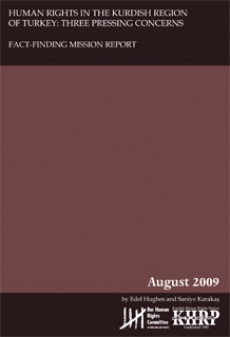| Éditeur : KHRP | Date & Lieu : 2009, London |
| Préface : | Pages : 58 |
| Traduction : | ISBN : 978-1-905592-25-8 |
| Langue : Anglais | Format : 148x210 mm |
| Thème : Politique |
|
Présentation
|
Table des Matières | Introduction | Identité | ||
 HUMAN RIGHTS IN THE KURDISH REGION OF TURKEY: THREE PRESSING CONCERNS FACT-FINDING MISSION REPORT The Kurdish Human Rights Project (KHRP) organized a fact-finding mission to the Kurdish region of Turkey from 1 to 7 May 2009 to gather information on the human rights situation there, with a particular focus on impunity of state officials, women’s access to justice and restrictions on the work of human rights defenders. The mission interviewed local MPs, mayors, human rights activists, lawyers and journalists in the provinces of Şırnak, Siirt, Mardin, Batman and Diyarbakır in order to assess developments in these areas in recent months. | |||||
| I. GEOPOLITICAL BACKGROUND Since the inception of the modern republican state in Turkey in 1923, following the downfall of the Ottoman Empire, the country’s religious, linguistic, ethnic and cultural minorities have been systematically marginalised and suppressed. Under the leadership of Mustafa Kemal Atatürk, the state instigated a lengthy process of reform designed to move Turkey away from its previous ‘Arabised Ottoman identity’ towards a new ‘Turkish Nationalism’. The Kemalists advocated a unified Turkish state based on one people and one language, in an attempt to convert an ethnically heterogeneous population into a homogenous body of Turkish citizens. This process involved the suppression of the religious identity and cultural expression of non-Turkish people within Turkey, particularly the Kurds, the country’s largest non-Turkish minority who were a majority in the south-east. At the heart of Atatürk’s project was the dissolution of this cohesive community. This led to a campaign of mass exile and village destruction in the Kurdish region, which continued until 1946. | ||||